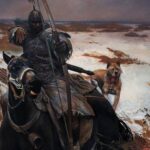How did the rest of Europe react when Napoleon III became the Emperor of France? Louis-Napoleon Bonaparte, the nephew of Napoleon Bonaparte, became Emperor of the French as Napoleon III in 1852 through a coup d’état. His ascension to power marked the establishment of the Second French Empire. The reactions of other European nations to Napoleon III’s rise to power varied.
Concern among Monarchies:
The monarchies of Europe, particularly in Britain, Russia, and Austria, viewed Napoleon III with suspicion. They were wary of his Bonapartist ambitions and feared the influence of revolutionary ideas associated with the Bonaparte family. Napoleon III’s regime was seen as a potential destabilizing force that could inspire nationalist and republican movements.
Mixed Reactions:
Some European powers, notably Britain, initially had a cautious but pragmatic approach to Napoleon III. Diplomatic relations were maintained, and there were efforts to engage in a balance of power diplomacy. However, there was also a degree of skepticism regarding his intentions and the stability of his rule.
Relations with Britain:
Napoleon III sought to improve relations with Britain, and he engaged in a policy known as the “Entente Cordiale” to ease tensions between the two nations. This diplomatic initiative aimed at securing British neutrality or support in case of conflicts on the European continent.
Italian Unification:
Napoleon III played a role in Italian unification by supporting the Piedmontese forces against Austria in the Second Italian War of Independence (1859). This move earned him some sympathy in Italy, particularly among nationalists, but also increased tensions with Austria.
Crimean War:
During the Crimean War (1853-1856), Napoleon III’s France allied with Britain and the Ottoman Empire against Russia. The war had geopolitical implications for the balance of power in Europe, and Napoleon III’s role in it influenced diplomatic dynamics.
Decline in Influence:
Over time, Napoleon III’s influence and power waned. The military defeat in the Franco-Prussian War (1870-1871) led to the collapse of the Second French Empire, and the subsequent establishment of the Third French Republic. This turn of events reshaped the political landscape in Europe.
In summary, the reaction to Napoleon III’s rule was mixed across Europe. While some powers were initially cautious and skeptical, others engaged in diplomatic relations. Ultimately, the downfall of Napoleon III had significant repercussions, contributing to the transformation of France into a republic and influencing the geopolitical dynamics of Europe.


